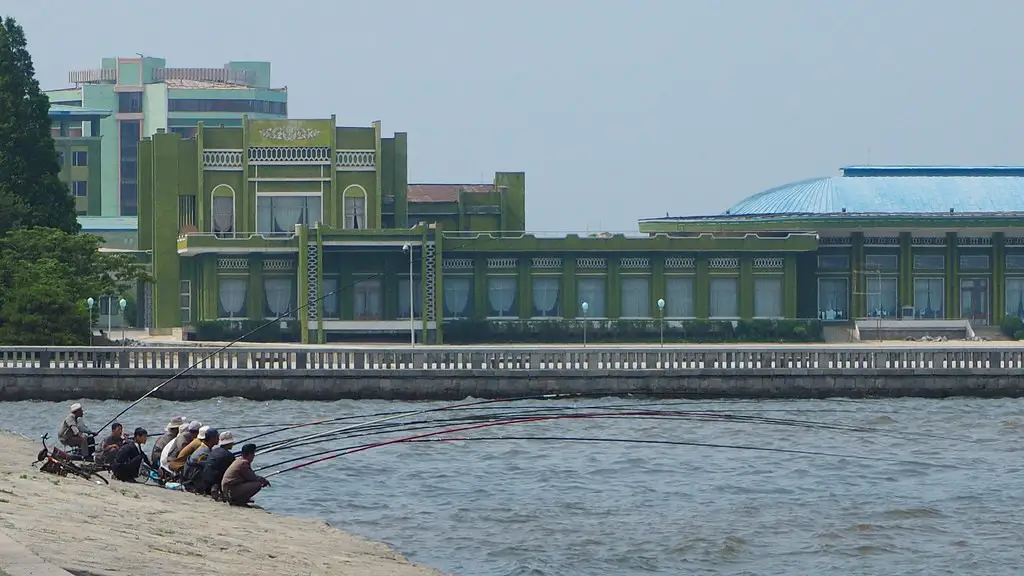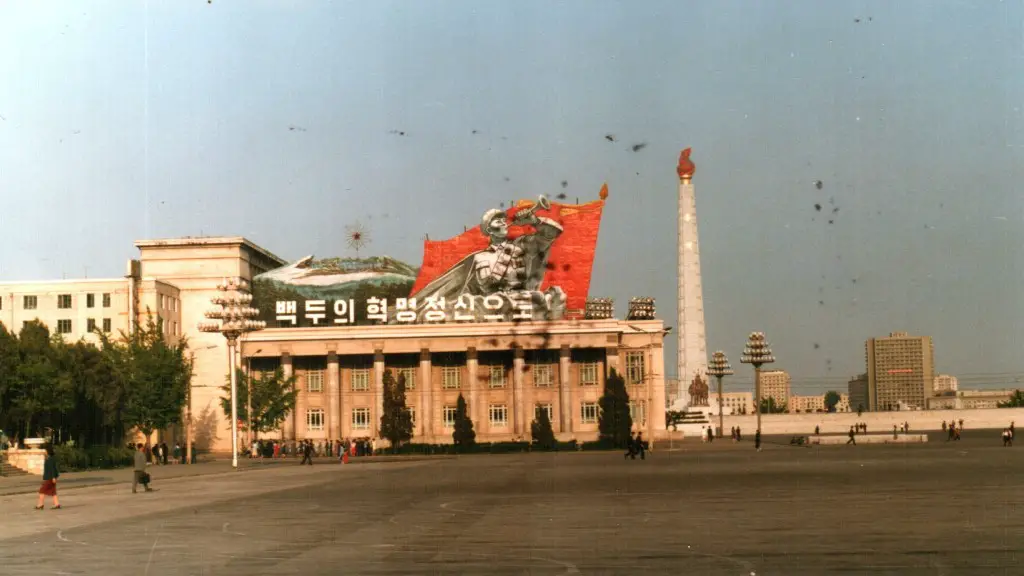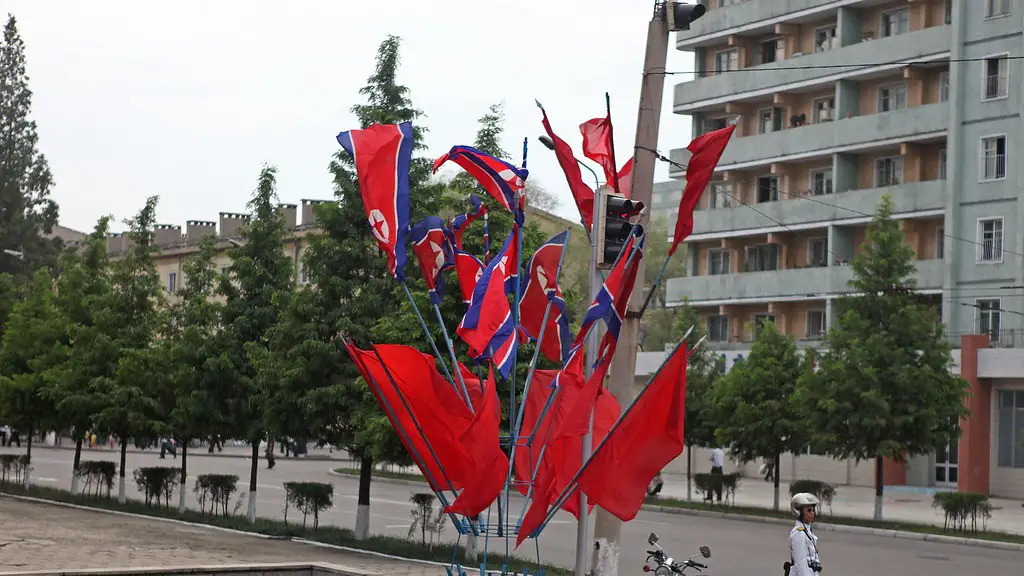It has long been a question of debate among experts about the level of imports and exports in North Korea. This closed state is known to lack natural resources, so it is no surprise that a great many researchers have been intrigued by this question. The truth is that North Korea does have a considerable amount of trade among its neighbor states, although it is highly restricted by the government due to the country’s potentially-hostile relationships with all foreign powers. In that sense, North Korea is somewhat unique compared to other heavily-closed nations in terms of their trade policies.
Traditionally, the imports and exports of North Korea have mainly been conducted with its two much larger neighbors, China and Russia. The two countries have managed to maintain strong trade ties with Pyongyang since the Korean War, and are largely responsible for ensuring a steady stream of goods and services despite international sanctions. In order to ensure their stability, North Korea’s exports have mainly consisted of products such as coal, minerals, and seafood, whereas imports have mainly consisted of oil, fertilizer, and luxury goods. Although the exact figures are difficult to find, it is estimated that these exchanges account for about 30 to 40 percent of the North Korean GDP.
Recently, South Korea has also become a more significant trading partner. In fact, President Moon Jae-In has made it one of his top priorities to strengthen cross-border exchanges as a means of promoting peace and stability on the Korean peninsula. South Korea is now directly providing humanitarian aid to North Korea, as well as helping to increase economic cooperation between the two in terms of both imports and exports. Such initiatives have had a positive effect on the economy of both countries, as they have been able to gain access to essential goods and maximize economic gains.
It is clear that North Korea has some amount of imports and exports, notwithstanding the restrictions put in place by the government in order to maintain control over the population and ensure relative safety in an increasingly dangerous environment. Nonetheless, it is difficult to gauge the exact amount or value of these exchanges as the country’s economy remains largely unaccounted for. Nevertheless, the evidence so far suggests that North Korea does have a decent level of trade with both neighboring countries and South Korea for mutual benefits.
Local North Korean Businesses
Although North Korea has a reputation for being heavily isolated, this does not mean that its citizens have no access to the outside world in terms of acquiring goods and services. This is evidenced by the growing number of small businesses that have opened up in the country over the past few years. Although not as large or well-funded as their counterparts in other countries, these local businesses have been able to supply their customers with basic food items, clothing, and other necessary items.
These businesses are also beginning to engage in some level of international trade, as they are able to obtain necessary items from foreign sources such as China and Russia. This is becoming increasingly important in a country where food and medical supplies are in short supply. It is also a way for local business owners to make a living and help to move the economy in a more positive direction.
These small businesses are still heavily regulated by the government and must comply with strict rules in order to remain open. Nonetheless, their presence does suggest that there is a certain level of imports and exports taking place in North Korea, albeit not at the same scale as their larger counterparts.
International Impact
North Korea’s imports and exports have also had a significant impact on the global economy. For instance, China and Russia are both major players in the international market and have been actively trading with North Korea in order to boost their own economies. Despite the fact that these transactions are hardly ideal from a political point of view, they nonetheless serve to provide both sides with certain benefits.
The same can also be said of South Korea, which has recently increased its trade with North Korea. By doing so, Seoul has gained access to a new source of much-needed resources and products that were previously unavailable due to the restrictions imposed by the government. This not only helps to improve the economic situation in South Korea, but is also beneficial to North Korea as it opens up new markets for their products and can potentially improve their overall economic situation as well.
Trade Between North Korean and US
It is also important to consider the level of trade between North Korea and the United States. Despite the hostile political climate between the two countries, there have been attempts at engaging in some level of economic cooperation. Recently, the Trump administration has proposed lifting some of the sanctions in order to encourage North Korea to take steps towards denuclearization. This has been met with cautious optimism, as it could potentially lead to a more stable economic relationship between the two.
However, it is important to remember that the US will likely still retain control over exports to North Korea, and that these exports will likely remain highly restricted. This could put a dampener on any potential progress that could be made in terms of North Korea’s economic development in the near future.
Political Ramifications
It is clear that North Korea’s imports and exports have had a profound effect on the policies of both the North Korean government and its neighbors. On the one hand, these exchanges have allowed for some level of economic cooperation between all of the countries involved, which can be beneficial in the long run. On the other, it must also be remembered that North Korea’s government retains a great deal of control over these activities and is notorious for enforcing stringent regulations.
This means that any changes that do occur in terms of economic exchanges between North Korea and the rest of the world will be carefully monitored by the government, and that any attempts to break these regulations could be met with severe consequences. It is clear then, that imports and exports are an issue of great political sensitivity in North Korea, and that the key to their success lies in the ability of all parties to maintain a delicate balance.
International Ideology
Finally, it must also be noted that North Korea’s imports and exports are heavily influenced by the country’s firm commitment to its ideology. This ideology is largely based on a fiercely independent stance towards the rest of the world, and as a result, North Korea’s government is highly suspicious of any attempts to open up its economy to foreign entities. In that sense, North Korea’s current trade policies are largely designed to achieve the goal of maintaining political autonomy from outside influences.
This has led to a situation where the country is largely closed off to the rest of the world, and where any attempts to engage in international trade are highly scrutinized by the government. As a result, it is difficult to gauge the exact level of imports and exports that are taking place in North Korea, but it is clear that the issue is important one that warrants further examination.
Economic Risk
Despite the efforts of the international community, North Korea still retains a high level of economic risk. According to economists, the country’s economy is heavily reliant on imports and exports, and is therefore at the mercy of external forces. As such, any economic downturn in the country’s major trading partners could have a major negative impact on the North Korean economy, making it even more vulnerable.
Furthermore, the international sanctions placed on North Korea have also had a damaging effect on its economy. Although the UN has recently begun to ease some of the restrictions, the country still remains largely isolated from the global economy. This has had a direct impact on the availability of goods and services, and has further hindered the country’s ability to engage in meaningful trade.
Opportunities for Improvement
There are also opportunities for North Korea to improve their imports and exports. Better relations with third-party countries could enable North Korea to access new sources of goods and services. This could be beneficial in the long run, as it would open up new markets and provide them with the access to much-needed resources.
It is also important to note that North Korea has recently taken some steps towards economic reform. Although there is still a long way to go, some international organizations have observed that the country’s overall economic situation has improved over the past few years due to the implementation of some market reforms. This could potentially make imports and exports more attractive to the North Korean government and lead to more meaningful exchanges between the country and the rest of the world.
Current Status
In light of the above, it is clear that North Korea does have some level of imports and exports, though the exact numbers remain largely unknown. That being said, it also appears that the current restrictions on trade have had a significant impact on the country’s overall economic situation, and have hindered its ability to engage in meaningful cooperation with its major trading partners. Thus, it remains important for all sides to take into consideration the potential risks and benefits of engaging in international trade with North Korea, in order to ensure that the process is beneficial to all involved.





